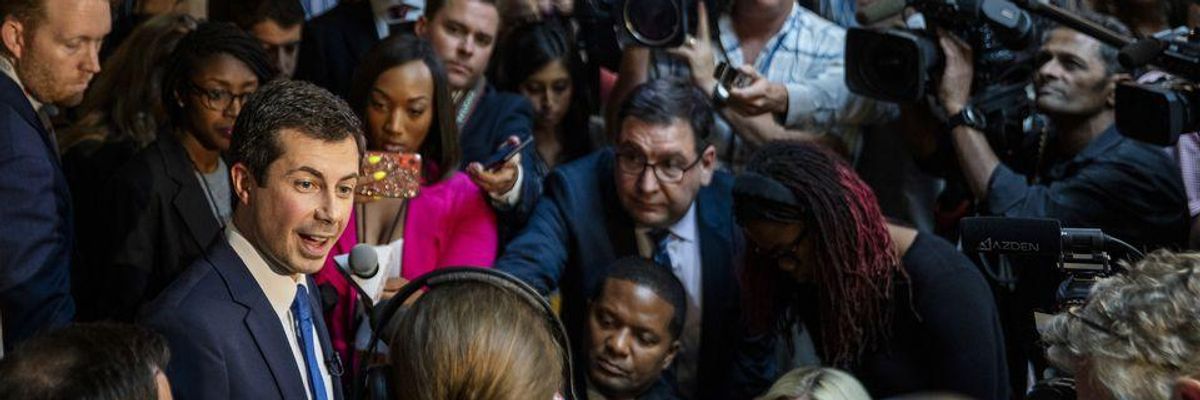Democratic primary voters and caucus-attendees are of two minds about the 2020 presidential general election campaign.
A majority of them want it to be like one of those hockey games where the players drop their gloves and start fighting the moment the puck is dropped. They want a candidate who welcomes a bench-clearing brawl with President Trump. And they want the melee to be about something big: an explicit and unapologetic liberal agenda, devoid of global-oney and neoliberal trims.
At the same time, a greater majority of Democratic voters simply want to beat Trump and worry about the rest later. Anything that might endanger his defeat is therefore disqualifying. Whatever general-election voters in the key states need to hear to vote against Trump, that's the Democratic platform.
Back and forth it goes. The California State Democratic Party delegates boo Democratic presidential candidates who are critical of socialism. Joe Biden is talked up as the party's surest bet in November 2020. Biden is lambasted for his past support of the Hyde Amendment. Bernie Sanders and Elizabeth are described (again and again) as too liberal, a.k.a. "unelectable."
Enter the polls. Polls are the MRIs of "electability" and provide pseudo-scientific precision to forecasting future outcomes. They enable TV talking heads to winnow candidates out and, to paraphrase the late Senator Fred Harris, "winnow candidates in."
The problem, for the moment anyway, is that electability isn't thinning the field. Sanders and Warren are beating Trump in most hypothetical matchups in national and key state polls, and sometimes by margins outside the margin for error. And in some battleground states, the second-tier Democratic candidates are beating Trump as well. It's hard to make the case that Sanders and Warren and Harris are unelectable if the polling data say that each would win.
Which brings us to the media.
Major media coverage of a presidential campaign breaks down into four parts: the preprimary season, the primary season, the summer conventions, and the general election season (including the debates and the expensive election night broadcast).
What happens every four years, without fail, is that major media organizations blow through their preprimary budgets. In the run-up to the Iowa caucuses, they have already begun eating into the budget for primary coverage.
By the time the Iowa caucus results are reported and the campaign caravan decamps to New Hampshire, the CFOs of the various news organizations (and their parent companies) are apoplectic, muttering darkly about "wild overspending." Word quickly comes down from on high: It has to stop.
And stop it does. After New Hampshire, the coverage of many candidates becomes the coverage of two (maybe three, but probably not). Costs are cut by relying on affiliates and local news outlets to provide video and text from "the campaign trail," which is then stitched together by producers and editors in New York.
The real campaign plays out in Manhattan and Washington television studios. Cable news outlets (especially) make every effort to push the "campaign" into television studios and away from "the campaign trail."
Because of budget concerns, the pressure to anoint a winner increases as the early March Super Tuesday primaries near. We saw this in 2016. Hillary Clinton was declared the winner long before she actually won the nomination. This time, California will be deemed decisive. Whoever wins there, it will be said, wins the nomination.
The rationale for this projection will be financial fact: Every losing candidate will have spent his or her last dollars on advertising in frightfully expensive Super Tuesday media markets. Reality will say they cannot carry on (without money). Reports of the winner's post-Super Tuesday fund-raising windfall will reinforce this analysis.
In the meantime, coverage of the Democratic presidential nomination campaign will be framed by a "brackets" narrative. The semi-finals bracket narrative has already commenced.
Joe Biden, for the moment, leads in the "most-likely-to beat-Trump bracket." (Pete Buttigieg is moving up.) Elizabeth Warren and Bernie Sanders are running neck and neck in the "street fight" bracket, although it appears that Warren has gained the upper hand.
The finalists will be chosen by Iowa and New Hampshire. The finals will play out against the backdrop of electability. If surveys show that Warren is just as likely to beat Trump as, say, Biden, she'll win Super Tuesday and, in all likelihood, be the nominee.
Which brings us to one last point about the Democratic primary and caucus electorate. They want the nomination process over quickly. Preferably, they'd like a nominee by mid-March. Whether it's Biden or Warren or Buttigieg or Sanders, at some level, doesn't matter. They just want to drop the gloves and start the brawl, with or without an agenda.
